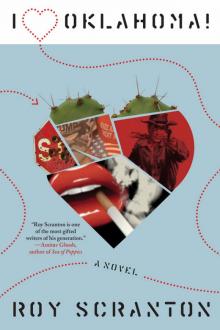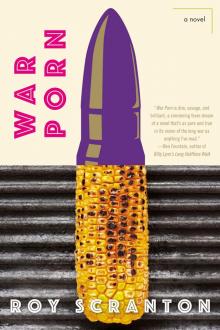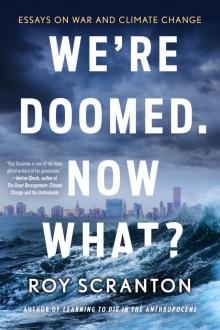- Home
- Roy Scranton
I Heart Oklahoma! Page 5
I Heart Oklahoma! Read online
Page 5
“I see.”
“Et toi, Remy?” Suzie said in cartoon French. “D’où viens-tu?”
“I ‘come from all over’ as well, in my way,” he said, “though perhaps a different ‘all over.’ My father worked for CNN, my mother’s a doctor. When I was very young, my father was posted to Paris, so we all went along, and I more or less grew up there, though we came back to the States fairly regularly. My mother wasn’t able to work as a physician in France, but she got a job with Médecins Sans Frontières, and I traveled with her now and again to Africa. When I was in high school we moved to Brussels. I went to school at Wesleyan, like my parents, premed, but then became obsessed with Alexander von Humboldt and spent a year in Berlin—which seemed a great rebellion, in its way, given my parents’ Francophilia and my father’s Jewish heritage—but they were very supportive, of course. In any case, it was in Berlin that I fell in love with German cinema and film in general, and when I came back to Wesleyan the next fall I changed majors. Then I got an MFA at CalArts, worked in Hollywood for a few years, and subsequently moved to Brooklyn.”
While he talked, Suzie imagined taking his bottom lip in her teeth, and the image warmed her. Probably a bad idea, she thought, which didn’t diminish its appeal. “You’re cute,” she said.
He smiled at her. “Et vous, Suzanne.”
Then Suzie dropped her cigarette butt out the window, put her hand on Remy’s knee. She watched him watch her, unblinking, as she leaned in, shifting in her seat, laying one hand on his delicate cheek and sliding the other up his thigh.
She looked down at the V-neck of his T-shirt. “I think I need some help,” she said.
Horses in a field, black eyes staring, red dust rising round hooves.
Heaving to her feet at the knock, she fumbled her sleep mask off, glasses on, panicked at the strangeness of the room, whose room, when did she get a TV? Gray light poured in through the gauzy curtains and turned everything felt, as if the room were a Joseph Beuys.
“Yeah,” she said, “just a minute.”
“Get up,” she heard Dad shout.
Thoughts connected by the most tenuous filaments, separated by yards of bunched cotton, pulled slow through rusted subterranean pipe. Road. Movie. Remy. The fuck’s wrong with her? Every goddamn time.
“I’m up,” she shouted. Her pants? Where pants?
“Time’s a wastin’,” Jim shouted through the door.
“Hold the fuck on!” A dark splotch on the carpet resolved into jeans and she tugged them on, stumbling toward the door, catching a look in the mirror, the puffy-eyed, slack-cheeked face of lo, how the mighty have fallen. You look like ass, Princess.
She swung the door open and leaned against it, glaring at Jim standing there in his mirrored aviators. “The fuck’s on fire, Gene?”
“Morning, sunshine,” he said, nearly chirping. “It’s eight o’clock. We need to get moving so we can hit the battlefield. Up late working on your pages?”
“Yeah,” she said, nodding, “sure, but then, you know, Inception 2 was on HBO and I just can’t resist Leo.”
“Remy and I are going down to breakfast. We’re gonna leave in like half an hour. That work for you?”
“Yeah, yeah. Good to hook. Save me a bagel, will ya?”
“Don’t be late!” Jim said, grinning.
She closed the door. Thankfully, there wasn’t much to pack, and also thankfully, after leaving Remy, she’d come up and written her two pages and printed them on the mini-printer Jim had brought along. She had a quick shower and tried to salvage a face, then said fuck it and threw on a pair of shades.
Jim and Remy sat watching CNN over breakfast wreckage, Froot Loops and apple cores and a pair of giant squid washed up on the beach in Indonesia. Two American special forces operatives killed in Sinaloa. Maverick and Goose looked up as she came in, and she realized they’d been talking about her: bros before hos. Remy’s eyes, gray now in the milky light, never stopped filming.
“Saved you a bagel,” Jim said.
“Where’s the coffee?” she growled, squinting at two brats clambering over a chair at the next table and their dough-faced Oompa-Loompa ma blinking up in stunted hostility.
Remy gestured toward the breakfast bar. “Continental breakfast,” he said. She could hear the scare quotes around “Continental.”
She got her coffee and a bowl of Life, then came back and sat, determined to play out her hand. “What’s the rush, Gene? Playing soldier this morning?” She tore the plastic off her bagel and split the O with her thumbs, disturbed by how much the crust felt like a cheap PVC dildo. She watched an ad for paper towels—blue spillage, orgasm mouth—while she scraped butter across the plane of her bagel’s face. She did not look at Remy. She did not even think of him. She refused to let his presence enter her consciousness.
“Gettysburg,” Jim said. “The Battlefield. The blue and the gray, the Union and the Confederacy. Fourscore and seven years ago, something something something. I’m hoping for tourists, but mostly I just want the historical weight, the heaviness of the bloodstained ground. The Battlefield.”
“The battlefield,” she said, her voice flat. “Do you even know who fought at Gettysburg?”
“The North. And the South.”
“I mean which generals, Gene.”
“Robert E. Lee and Ulysses S. Grant. I don’t care. Who cares?”
“Who won?”
“Easy,” he said. “The North. No, wait. The South.”
“The North won,” Remy said, eating a Froot Loop. “Gettysburg is commonly recognized as the turning point of the war. Lee had advanced into Pennsylvania, hoping to take the war north to Harrisburg or even Philadelphia, but General Joseph Hooker and the Army of the Potomac blocked Lee’s advance. Just a few days before the two armies met, Hooker tendered his resignation, and Lincoln gave General George Meade command over the Union forces. Lee advanced toward Gettysburg, hoping to engage and destroy the Army of the Potomac, but over three days of fierce fighting Meade’s forces held. Around fifty thousand men died on both sides. Lee withdrew across the Potomac to Virginia, and the Union army took the offensive.”
“The point is not particular narrative fact,” Jim said, a twist in his lip. “It’s the idea.” He waved at the TV. “The point is you don’t have to know. It’s not about numbers and generals and all that fucking schoolbook bullshit. It’s war. Blood. Violence and death and dramatic reversals. Every American knows Gettysburg and Lincoln freed the slaves and Lee was stabbed in the back. The point is the mythology.”
She remembered the taste of Remy’s skin, his long fingers bending and pressing, then the fumbling and choked excuses, backing out of the car, walking off leaving the door open behind her. “Tara,” she said.
“Sherman’s march to the sea,” said Remy.
“Exactly,” said Jim. “I’m not concerned with facts. I want the worship of mythical forms. I want fat tourists in cargo shorts and white sneakers kneeling at the bloody altar. I want people who have come to pray. The great forces that shake the world are not facts, not even ideas, but emotion, ignorant passion, blind aggression and terror and choked rage, superstition and racial hatred and witchcraft. I want to drink from the blood groove of American genocide.”
“Well, you picked a good spot for it,” Suzie said, gesturing with her coffee across the room, now filling with families in vacation gear microwaving egg, cheese, and sausage Jimmy Deans, pumping orange juice from the machine, peeling crinkly plastic off croissants, pouring GoLean into shiny disposable bowls, all of them half watching Jim from the corners of their eyes, alert to the atavistic rhythms of his rant, ready to align themselves and listening for the signal: Would this be the moment they were called to action? Had all their hours handgun training and filling out forms for concealed carry permits led them to this fateful crisis, here, now, in front of their families and the Hilton staff and
all America, to rise as one nation and strike?
Terrorist tunnels had been discovered under the border wall, a lone shooter killed five at Spotify HQ, and Miley Cyrus announced she’d converted to Islam and would be making the hajj. “I think Sufism is the most beautiful idea in the world,” she said.
“We should go,” Jim said, his mirrored lenses reflecting bloat vigilantes angling shot lines.
“Let me finish my coffee,” Suzie said. “What’s the plan after Gettysburg?”
“The Battlefield.”
“Whatever. After the battlefield.”
“After the Battlefield, we head west. I’m hoping we can make it to New Castle tonight, home of the New Castle Fieldhouse: the largest high-school gymnasium in the world. On the way we do your pages.”
“Okay.”
“I was thinking you could write something not in the car. Like some dialogue at a rest stop or a gas station, maybe a restaurant. Like in the hotel.”
“Like right now?” she asked.
“Yeah, like right now,” he said.
“Well, I wrote this scene,” she said. “Just like this. My words in your mouth.”
Jim frowned. “I mean something dramatic. Engaging. It’s important to bring out the inchoate tensions within the group.”
“Just so,” Suzie said. “The question of desire: What do these characters want? What obstacles block their way? What conflicts might emerge within and between these imaginary people? How do we raise the stakes?”
“Sure,” Jim said. “If you’re into the psychologized liberal self. I was thinking more the deterritorialization and reterritorialization of the assemblage.”
The secretary of defense would neither confirm nor deny allegations of American drone strikes in Venezuela.
“Gotcha,” Suzie said, drinking the last of her coffee. “The assemblage.”
Jim’s cheek twitched. “Yes.”
“Well, then,” Suzie said. “Let’s fucking assemble.”
“You gonna wear those sunglasses all day?” Jim asked.
“Are you?”
“Let’s go,” he said, standing up.
On their way out, Remy observed that the Muzak was Neil Young’s “Walk On,” which he said seemed like a good omen.
They drove and drove and drove, listening to the radio, switching between Contemporary Christian Beats and NPR, the green Valiant rolling beneath thick skies and transient cloudbursts, past green hills and trees reflected in mirrors and glass, more trees, cornfields, soybean fields, gas stations, driverless semis, college kids in old manual-steering beaters, now and then somebody asleep behind the wheel as the car drove. Waves of water fell from the sky then cleared, flushing the world gold black gray and blue.
“I wish there were more Amish,” Jim said. “Or at least Mennonites.”
Remy caught the light.
“How about lunch in Somerset?” Jim said. “I wanna stop in Somerset.”
“What’s in Somerset?” Suzie asked.
“Somerset is known for its sizeable wind farm,” Remy replied from the back. “It was also one of the towns involved in the Whiskey Rebellion.”
“The what?” Suzie said.
“The Whiskey Rebellion. In 1791, George Washington’s government imposed the nation’s first federal tax, on distilled spirits, as part of Alexander Hamilton’s plan to pay off debts incurred fighting the Revolutionary War. Whiskey distillers in the frontier regions—specifically and especially western Pennsylvania—resisted, first because they considered it taxation without representation, second because whiskey was, on the frontier, a form of currency. By 1794, the resistance had erupted into armed insurrection, centered around Monongehala, south of Pittsburgh. The preacher Harmon Husband, one of the rebellion’s leaders, was from Somerset.”
“Well?” Suzie said. “What happened?”
“The federal government raised a thirteen-thousand-man militia and marched on western Pennsylvania. The insurrection collapsed without a fight, and some two dozen leaders were indicted on charges of high treason. I don’t quite recall what happened then. I believe a few were hanged. Also near Somerset—actually closer to Shanksville—is the Flight Ninety-Three National Memorial.”
“Do you just memorize Wikipedia?” she asked.
“I’m a robot,” Remy said.
“I thought you preferred ‘digital person,’” she said, not sure if he was joking.
“I do research. I have a list of interesting sights along likely routes, and I review each day’s route the night before. I make notes. I remember things. Also I know a guy who wrote a book about it. The Whiskey Rebellion. He went to Oberlin.”
“You know they fucking shot that plane down, right?” Jim said.
“Wait, what?” Suzie said.
“Flight 93. Shot down by American F-16 Falcons. On the vice president’s orders.”
“You believe that? Like jet fuel can’t melt steel beams?”
“I don’t know about that, but listen. The black box was faked. The call was faked. Cell phones don’t operate over thirty thousand feet. Try it next time you fly.”
“Cell phones?”
“Yeah, try it. All that ‘Let’s roll,’ it’s fucking bullshit.”
“So you want to visit the memorial?”
“No, no, fuck all that. It’s a smear in a field. The Whiskey Rebellion is interesting, in juxtaposition—I mean, they’re both stories about the federal government killing Americans—but the resonances . . .” Jim’s words trailed off.
Suzie lit a Parliament and cracked the window.
“Gettysburg, Whiskey Rebellion, Flight Ninety-Three,” Jim muttered. “George, George, Abraham and Isaac, God will provide the ram.”
“What are you talking about?”
“The mere proximity of events sets them ringing. History accretes, blood soaks into the earth, the air grows thick with ghosts. Too many bodies. But the ramdom . . . Ha. God will provide the deep surface.”
“You okay?” Suzie asked.
“Look, what’s the connection? Decades separate each event, more than a century between Gettysburg and Flight Ninety-Three, but they infect the geography of the mind. They resonate off each other. They warp our map of the world, like gravity warps space-time, drawing each discrete event into every other, one by one, each into each in totality. One by one, the events collide together until they initiate the singularity, everything collapsing in a great black involution, the holy rectum of the cosmos, and we shall be reborn in blood and fire . . . Or not. Or it’s just land, rock, and water, and my brain insists it coheres in a rational pattern. What does one thing have to do with another? How does the left hand connect to the right? One day and the next, nothing, nothing, or everything all together, and the strongest pull is the story, cause and effect, here and there, but it’s also the most delusional, because there is no story . . . And . . . But . . . Going back again, making it make sense is the only way it makes sense. That’s the fucking rub, Suzie Q. Why are these monkey brains so primitive and superstitious? And how can it be that that selfsame savage thought is the only chance we ever get at enlightenment? Riddle me that.”
Eye roll. “I dunno, Gene. Sounds pretty deep.”
Jim snorted. Suzie smoked. Remy watched the fields and trees and trucks.
Lunch at Mel’s. According to the Somerset Daily American, read between them at the table, a local veteran was going to be honored and a Latrobe man had been injured in a fall. Temperatures were higher than historical averages for the twenty-eighth month in a row. After the meal Suzie got up and went to the bathroom.
Jim looked in his wallet. “You two fuck?”
Remy blinked owlishly. “What’s that?”
“You. Two. Fuck.”
“No. Not . . .” Remy took a sip of coffee. “No, Jim. We didn’t.”
“I mean, I’
d hit that shit,” Jim said, taking off his mirrorshades. “For real. Bet she sucks cock like a champ.”
“Wouldn’t know, Jim. We smoked and talked. These comments—”
“Oh, I bet you talked. Myea myea myea.” Jim jammed his middle finger in Remy’s face. “You fingerblast her, huh? Get up all in that shit?” Remy leaned back, not answering, not taking his eyes off Jim. “She’s pretty old, I guess, for you,” Jim went on. “Couple miles of rough road, know what I mean? Pussy’s probably chewed up like coleslaw.”
“Jim, that’s inappropriate.”
“Hit it or quit it, that’s what I say. Go big or go home. You know?”
People were looking now. “Jim—”
“Listen, Superfly, we’re making a movie. This ain’t no Love Boat. Slam that trim if you want, but if you do, I need close-ups. Got me?”
Something cold kindled in Remy’s blue eyes. “Jim, we have worked together for a long time, and you need—”
“I need?” Jim stood up. “I need? How ’bout you need. Who’s the big dog? Huh?”
Suzie came out of the bathroom and started walking toward them. “Jim—” Remy said.
Jim reached for his fly. “I will piss in your fucking face right now.”
“Fine,” Remy said. “You’re the big dog. Just sit down.”
Suzie came up to the table. “What the fuck, you two? Why’s everybody staring?”
“Mythology,” Jim said to Remy. Then he put his sunglasses back on. “Let’s get outta here.” He went to pay the check.
Suzie shot Remy a questioning look, but he shook his head and turned away.
They passed Wheeling at around three-thirty, and just the other side of town traffic slowed to a crawl. While they inched ahead, waiting to see the obstruction, they did Suzie’s pages.

 I Heart Oklahoma!
I Heart Oklahoma! War Porn
War Porn We're Doomed. Now What?
We're Doomed. Now What?